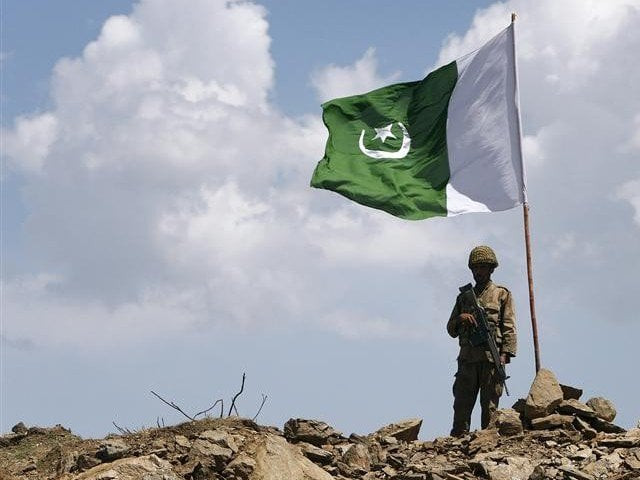Terror incidents continued to decline in 2018
Balochistan witnessed the most number of fatalities, followed by former tribal areas

Representational image. PHOTO: REUTERS
According to a report of the Centre for Research and Security Studies (CRSS), except for July 2018, the numbers of fatalities due to terrorism in each month of 2018 were significantly lower than the figure for the same months of the previous year.
“All forms of violence and counter-violence witnessed a significant decline in the number of fatalities this year [2018],” the report said, adding that the drop in fatalities from suicide attacks was marginal in 2018 which remained the biggest source of casualties in the country.
The report read that Balochistan witnessed the most number of fatalities (407), followed by former Federally Administered Tribal Areas (Fata), 208, Khyber Pakhtunkwa (K-P) 161 and Sindh (192).
As compared to 2,333 fatalities in 2018, the total number of deaths due to militancy was recorded to be 1,131. This figure is 45% less than the figure 2017. The greatest decline in such incidents was observed in Punjab, where fatalities dropped by 69%, followed by Sindh (57.8%), K-P(16%) and Fata (52.3%).
According to a report of the National Counter Terrorism Authority (Nacta), some 65 terror incidents took place in 2001 followed by 49 in 2002, 50 in 2003, 146 in 2004, 240 in 2005, 1,456 in 2006, 1,820 in 2007, 1,575 in 2008, 1,938 in 2009 and the highest number of terror incident (2,061) took place in 2010.
Terrorism in 2018: Four members of minority communities also among victims
The report said 1,680 terror incidents took place in 2011, 1,316 in 2012, 1,571 in 2013, 1,816 in 2014, 1,139 in 2015, 785 in 2016 and some 489 terrorism incidents were reported in 2017.
Terror attacks gradually dropped down after 2014, the year when Operation Zarb-e-Azb was launched and a national action plan was devised to counter militancy in the country.
“Although terror activities have sharply decreased owing to military offensive against militants, it is, however, extremely difficult to return to complete normalcy due to bitter ties between Pakistan and India,” said Imtiaz Gull, who heads the CRSS.
Gull said it is the military’s job and its focus was diverted to complete elimination of terrorism the 2014 APS carnage. He said the military started taking down the militants one after another and now the militants could not find space and a majority of them has left for Afghanistan.
“Now, we hear from Afghanistan since these people are being hunt down by the United States in drone strikes and recently the terrorist involved in Chinese Consulate attack was killed in a similar strike,” Gull told The Express Tribune.
With beefed up security and joint operations against militants across the K-P, the overall security was found better in 2018 as compared to the security situation in 2017 which is evident from the fact that only 34 terror attacks were reported in 2018 as compared to 47 such incidents in 2017.
Pakistan ranks fifth on Global Terrorism Index: report
According to provincial police, terror activities dropped by 27.65 per cent as compared to 2017 and the overall law and order situation also got better as compared to 2017. Cases of extortion, one of the major tools for raising funds for terror activities, also dropped. In 2018, a total of 36 extortion cases were reported by the provincial police. Some 42 cases of extortion were reported to the K-P police in 2017.
According to police, a total of 28 targetted killing incidents were reported in 2018. Twenty nine (29) such cases were reported in 2017. The K-P police said kidnapping for ransom also decreased by 16.6 per cent as five such case were reported in 2018 as compared to six cases of 2017.
“This Zarb-e-Azb, followed by RuF, was the turning point which proved to be successful as militants were rooted out from their sanctuaries,” said Brigadier (retd) Mehmood Shah.
Shah said intelligence based operations (IBOs) proved to be successful since small pockets in Kurram and Khyber tribal districts where militants had taken shelter after Zarb-e-Azb, were being raided and militants could now only escape to Afghanistan.
“Now with this fencing across Pakistan-Afghan border, militants are left with nothing. Once this fencing completes, these terror attacks, I hope, will ultimately come to an end,” said Shah, a security analyst and former additional chief secretary for the former tribal areas.
According to Shah, the threat exists not only in Pakistan but also in Europe and the United States but the steps taken by the military and political leadership in order to get rid of this menace are fruitful since militants have lost their infrastructure and the small pockets are being eliminated through IBOs.
“Operations are still under way and we are after everyone who has remained involved in anti-state activities and this is not going to conclude since we want all of them either to be brought to justice or eliminated,” a senior security official said.
The official, who requested anonymity since he was not entitled to speak to media, said the war against terror claimed lives of innocent citizens and security personnel including high ranking police and military officials.
Some 2,611km of the border with Afghanistan will be fenced by 2020 since 643 kilometers of the fencing has already completed both in the K-P and Balochistan. Over 800 fortes are being constructed along the border with some 230 already completed. Over 45,000 IBOs were carried out in 2018.
IBOs
Since start of the operation Radd-ul-Fasaad on Febraury 22, 2017, security forces have carried out 75,894 IBOs and combing operations. In 2018, a total of 44 major and 45,764 IBOs were conducted.
In Punjab six major operations and 9,157 IBOs were carried out, in K-P; four major operations and 21,508 IBOs; in Sindh 4,967 IBOs; and in Balochistan 34 major operations and 10,132 IBOs were conducted in 2018.
As a result of the Radd-ul-Fasaad, the Tahreek-e-Taliban Pakistan (TTP) former spokesperson Ehsan ullah Ehsan surrendered on April 17, 2017 and his nexus with Afghanistan’s National Directorate of Security (NDS) was exposed.
According to an official, it was also a success of these operations that Swat controversial cleric Sufi Muhammad ultimately issued a Fatwa against the TTP and its activities.
Due to RuF, the number of terrorist Incidents per month reduced from an average of eight incidents in 2013 to 1-2 in 2017 and 2018. Trend of civilian casualties varied from 2003 to 2018 with most civilian casualties (432) in March and January 2013 (414)
According to official documents, the number of check posts in the K-P shrunk in 2018 to 331 as compared to 469 in 2013. Prior to initiation of Karachi Operation in 2014, Karachi ranked 6th in the World’s mega cities with higher crime index. In first half of 2018, it ranked 60th.
Ceasefire violations
During 2018, a total of 2,933 ceasefire violations by India were reported in which 55 people got martyred and 300 got injured. A massive surge in ceasefire violation has been observed since 2014, when India violated the Line of Control (LoC) 315 times.



















COMMENTS
Comments are moderated and generally will be posted if they are on-topic and not abusive.
For more information, please see our Comments FAQ